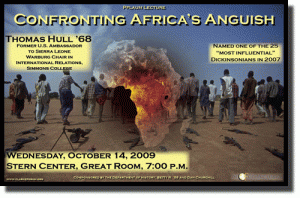Metzger-Conway Fellow, Warburg Professor International Relations, Simmons College
Pflaum Lecture
Confronting Africa’s Anguish
Wednesday, October 14, 2009
Stern Center, Great Room, 7:00 p.m.
(Part of The Clarke Forum’s “Leadership in an Age of Uncertainty” series)
Co-sponsored by the Department of History and Betty R. ’58 and Dan Churchill.
Africa has been afflicted with brutal, prolonged conflicts that capture our attention, but almost incomprehensibly resist negotiated resolutions. Examining common elements in the origins and nature of these conflicts can give us insight into their intractability, suggest paths to peace, provide criteria for effective international interventions, and reveal lessons for preventing recurring conflicts.
Topical Background
During the 19th and early 20th centuries, European powers established a significant colonial presence in Africa. This ‘scramble for Africa,’ which peaked just before World War I, divided the continent and its resources into political partitions. Europeans often justified African colonialism as “the White Man’s Burden,” an obligation to “civilize” the peoples of Africa. By 1905, African soil was almost completely controlled by European governments.
As a result of colonialism and imperialism, Africa has suffered long term effects, such as the loss of important natural resources, economic devastation, cultural confusion, geopolitical division, and political subjugation.
Decolonization began after World War II, and by 1980 virtually the entire African continent was independent. However, artificially drawn state borders and the repressive regimes that came to power often exacerbated ethnic divisions and fostered political instability. Persistent conflicts have further brought increasing migration, humanitarian catastrophes, epidemics, HIV/AIDS and criminal and terrorist networks.
The United Nations has sent peacekeepers to nearly every conflict-ravaged country on the continent. The largest UN peacekeeping contingent currently in Africa—approximately seventeen thousand troops—patrols the Democratic Republic of Congo. In recent years, the international community has pressured Africa to assume more responsibility for its own conflicts, prompting the African Union to dispatch peacekeepers to Darfur and Somalia. However, the limited capacity of the African Union means the United Nations will continue to play an essential role in African peacekeeping.
Biography (provided by the speaker)
Tom Hull is the James P. Warburg Professor in International Relations at Simmons College in Boston and former U.S. Ambassador to Sierra Leone. At Simmons he teaches on U.N. peace operations and African politics. His diplomatic career, which ended in 2007, also included 22 years in South Africa, Ethiopia, Nigeria, Somalia, Burkina Faso, and Zaire and in Washington as director of African Affairs at the U.S. Information Agency before its merger with the State Department.
Ambassador Hull’s involvement in Africa began in 1968 when he graduated with a history major from Dickinson College and became a Peace Corps teacher in Sierra Leone. He subsequently earned master’s degrees in international education and international affairs at Columbia University and the certificate of Columbia’s Institute of African Studies. Ambassador Hull was writing a doctoral dissertation at Columbia and working with former Senator J. William Fulbright at the Institute of International Education in New York when he joined the Foreign Service in 1976.
He was also a diplomat in Czechoslovakia beginning in 1989 for which President Clinton gave him a Presidential Meritorious Service Award in 1993 for his contributions to the collapse of communism and the restoration of democracy in the successor Czech and Slovak Republics, where, inter alia, he established Fulbright Commissions for educational exchange with America.
Ambassador Hull and his wife Jill have one daughter, Kirsten, who graduated from Dickinson in 2001.
Video of the Program

